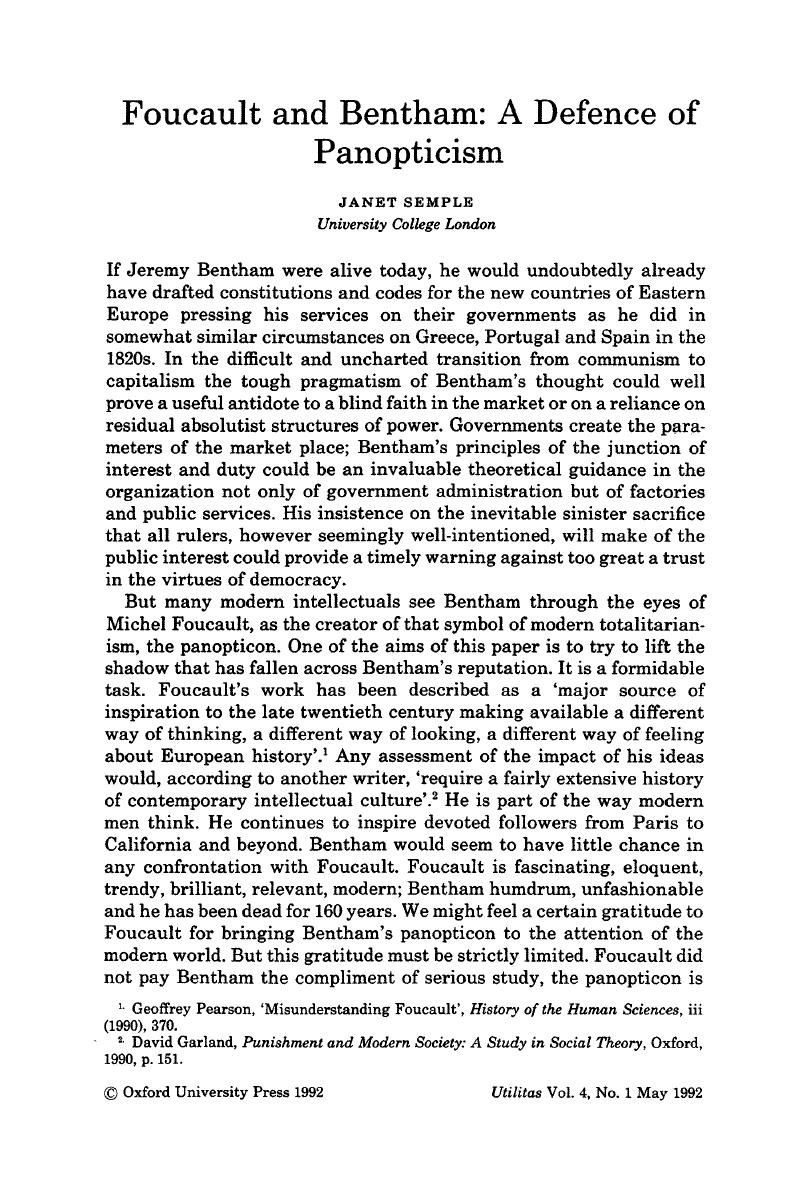Article contents
Foucault and Bentham: A Defence of Panopticism
Published online by Cambridge University Press: 26 January 2009
Abstract

- Type
- Discussion
- Information
- Copyright
- Copyright © Cambridge University Press 1992
References
1. Pearson, Geoffrey, ‘Misunderstanding Foucault’, History of the Human Sciences, iii (1990), 370.Google Scholar
2. Garland, David, Punishment and Modern Society: A Study in Social Theory, Oxford, 1990, p. 151.CrossRefGoogle Scholar
3. Walzer, Michael, ‘The Politics of Michel Foucault’, Foucault: A Critical Reader, ed. Hoy, David Couzens, Oxford, 1986, p. 51.Google Scholar
4. Nietzsche, F., The Will to Power, translated by Kaufmann, W. and Hollingdale, R. J., London, 1968, p. 266.Google Scholar
5. Foucault, Michel, Power/Knowledge, New York, 1980, p. 131.Google Scholar
6. Ibid., p. 97.
7. Foucault, Michel, The History of Sexuality, translated by Hurley, R., 2 vols., London, 1978, i. 140–1.Google Scholar
8. Foucault, Michel, Discipline and Punish: The Birth of the Prison, translated by Sheridan, Alan, Harmondsworth, 1977, p. 57.Google Scholar
9. Ibid., p. 82.
10. Ibid., p. 208.
11. Ibid., pp. 203 and 204. Foucault, Michel, Surveiller et Punir: Naissance de la Prison, [Paris,] 1975, p. 207.Google Scholar Alan Sheridan translates this as ‘cruel and ingenious’ (p. 205), but the original French better conveys Foucault's meaning—the word ‘savante’ also means scientist intellectual or scholar.
12. Ibid., p. 209.
13. Ibid., p. 217.
14. Ibid., p. 304.
15. Seigel, Jerrold, ‘Avoiding the Subject: A Foucaultian Itinerary’, Journal of the History of Ideas, xlvii (1990), 292.Google Scholar
16. Gordon, Colin, ‘History, Madness and other Errors: a Response’, History of the Human Sciences, iii (1990), 381.CrossRefGoogle Scholar
17. Mandeville, Bernard, An Enquiry into the Causes of the Frequent Executions at Tyburn, London, 1725, p. 37.Google Scholar
18. Discipline and Punish, pp. 23 and 31.Google Scholar
19. Garland, , p. 166.Google Scholar
20. Discipline and Punish, p. 222.Google Scholar
21. Ibid., p. 89.
22. Haskell, Thomas L., ‘Capitalism and the Humanitarian Sensibility, Part I and Part II’, The American Historical Review, xc (1985), 331–61 and 547–88.Google Scholar
23. The Correspondence of Jeremy Bentham, vol. iv, ed. Milne, A. Taylor, London, 1981 (The Collected Works of Jeremy Bentham), p. 342.Google Scholar
24. The Works of Jeremy Bentham, ed. Bowring, John, 11 vols., Edinburgh, 1838–1843, iii. 559.Google Scholar
26. UC xxvii. 105.Google Scholar
28. Bowring, , iv. 123.Google Scholar
27. Home, H., Historical Law Tracts, London, 1761, p. 2.Google Scholar Copy among Bentham's papers at University College London.
28. Discipline and Punish, pp. 200, 203, 205 and 225.Google Scholar
29. Bowring, , iv. 46.Google Scholar Foucault translates this as, ‘grand comité du tribunal du monde’. Alan Sheridan has retranslated this as the nonsensical, ‘the great tribunal committee of the world’ — Discipline and Punish, p. 207.Google Scholar
30. Discipline and Punish, p. 257.Google Scholar
31. Power/Knowledge, p. 152.Google Scholar
32. Securities against Misrule and other Constitutional Writings for Tripoli and Greece, ed. Schofield, Philip, Oxford, 1990 (CW), p. 136.Google Scholar
33. Bowring, , v. 384.Google Scholar
34. Technologies of the Self: A Seminar with Michel Foucault, ed. Martin, L. H., Gutman, H. and Hutton, P. H., Amherst, Mass., 1988, p. 163.Google Scholar
35. ‘Nonsense upon Stilts’, ed. Waldron, Jeremy, London, 1987, pp. 68–9.Google Scholar
36. First Principles Preparatory to Constitutional Code, ed. Schofield, Philip, Oxford, 1989 (CW), p. 266.Google Scholar
37. Hart, H. L. A., Essays on Bentham, Oxford, 1982, p. 2.Google Scholar
38. Discipline and Punish, pp. 201–2.Google Scholar
39. First Principles, (CW), p. 290.Google Scholar
40. Bernauer, James W., ‘Michel Foucault's Ecstatic Thinking’, The Final Foucault, ed. Bernauer, James and Rasmussen, David, Cambridge, Mass., 1988, p. 75.Google Scholar
41. Walzer, , p. 62.Google Scholar
42. UC cxii. 153–4.Google Scholar
- 22
- Cited by


